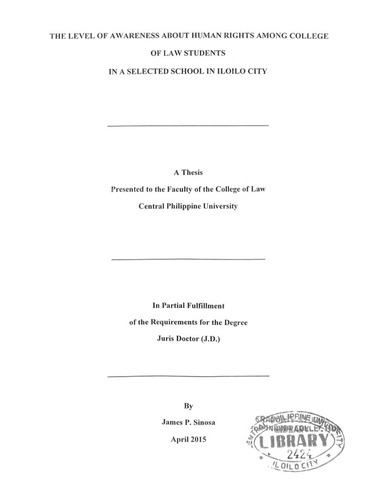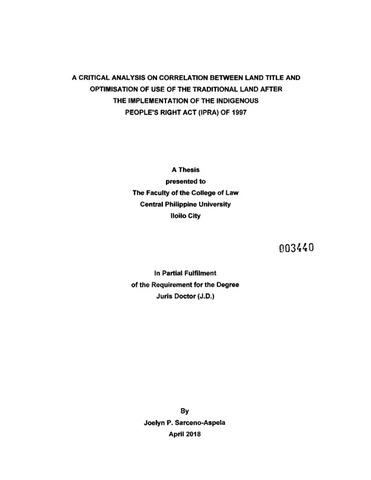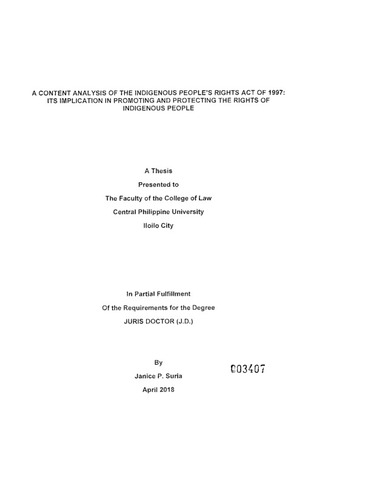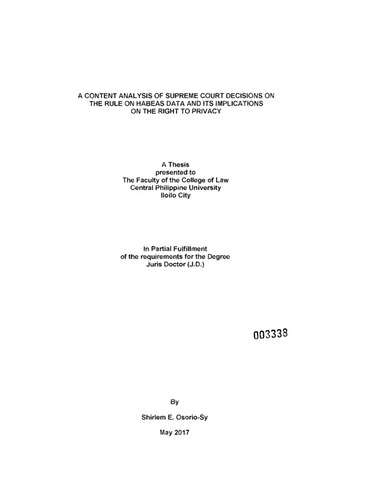The level of awareness about human rights among College of Law students in a selected school in Iloilo City
| dc.contributor.adviser | Alibogha, Salex E. | |
| dc.contributor.author | Sinosa, James P. | |
| dc.date.accessioned | 2021-02-10T08:26:17Z | |
| dc.date.available | 2021-02-10T08:26:17Z | |
| dc.date.issued | 2015 | |
| dc.identifier.citation | Sinosa, J. P. (2015). The level of awareness about human rights among College of Law students in a selected school in Iloilo City (Unpublished postgraduate thesis). Central Philippine University, Jaro, Iloilo City. | en_US |
| dc.identifier.uri | https://hdl.handle.net/20.500.12852/279 | |
| dc.description | Abstract only | en_US |
| dc.description.abstract | This study was conducted to ascertain the level of human rights awareness among the College of Law students of the Central Philippine University during the school year 2014-2015. Specifically, it sought answers to questions on the general level of the student’s human rights awareness, student’s awareness on civil, political, economic and socio-cultural rights and the difference in the human rights awareness of the students classified as to year level and gender. The respondents of this study were the thirty seven (37) students randomly selected among the four (4) year levels of the Central Philippine University College of Law. They compose the twenty (20) percent of all the students in each year level randomly selected. The simple random method was employed in the selection of the respondents. The students were classified according to certain categories: year level where they were enrolled in and according to their gender. When classified according to year level, there were 12 first year students, 9 second year students, 7 third year students and 9 fourth year students enrolled in the College of Law. The data needed for this study were obtained through a questionnaire borrowed from the Philippine Normal College Research Center. The instrument was divided into two parts: part I was a personal data sheet and part II was the questionnaire. The personal data sheet provided information on the respondent’s name, year level enrolled in, gender, economic status, religion and age. The questionnaire included 20 situations that refer to particular rights. These situations covered incidence where by civil, economic, political, and socio-cultural rights of the people are endangered or are under threat of violations. Each item was provided with four options. Options for each item were arranged interchangeably throughout the questionnaire. Each option had a corresponding level of human rights awareness. The level of human rights awareness scale and its corresponding explanations were borrowed from the Philippine Normal College Research Center and Task Force Detainees of the Philippines as published in the Comprehensive Course on Human Rights published by TFDP publications. The descriptive method of research was used in this study. This method includes all those studies that purport to present facts concerning the nature, knowledge of objects, a set of conditions, a class of events, a system thought or any other kind of phenomenon which one may wish to study. Described in this study were the different specific human rights such as civil, political, economic, and socio-cultural. Also described were the general level of human rights awareness, level of human rights awareness of the different aspects of human rights, and the difference in the level of human rights awareness when the students were classified according to certain categories of the Central Philippine University College of Law students. Taken as an entire group, the students reflected limited initiative in terms of human rights awareness. Moreover, the students manifested limited initiative in each of the three areas of awareness: Civil Rights; Political Rights; and Economic Rights but manifested militance, independence, and initiative in the socio-cultural rights awareness. Moreover, the students manifested limited initiative in three specific civil rights, which are: “right to public information”, “right to privacy of correspondence”, and “freedom from slavery”. On the other hand, the students reflected passivity or lack of interest and defeatism in their awareness of the “right to impart expression” and “right to own | en_US |
| dc.format.extent | ii, 133 leaves | en_US |
| dc.language.iso | en | en_US |
| dc.subject.ddc | GSL Theses 340.72 Si67 | en_US |
| dc.subject.lcsh | Human rights | en_US |
| dc.subject.lcsh | Civil rights | en_US |
| dc.title | The level of awareness about human rights among College of Law students in a selected school in Iloilo City | en_US |
| dc.type | Thesis | en_US |
| dc.description.bibliographicalreferences | Includes bibliographical references | en_US |
| dc.contributor.department | College of Law | en_US |
| dc.description.degree | Juris Doctor | en_US |
| local.subject | Human rights awareness | en_US |
| local.subject | Political rights | en_US |
| local.subject | Socio-cultural rights | en_US |
| local.subject | Economic rights | en_US |
| local.subject | Human rights violation | en_US |
| local.subject | Right to public information | en_US |
| local.subject | Right to privacy of correspondence | en_US |
| local.subject | Freedom from slavery | en_US |
Files in this item
This item appears in the following Collection(s)
-
Juris Doctor [144]





